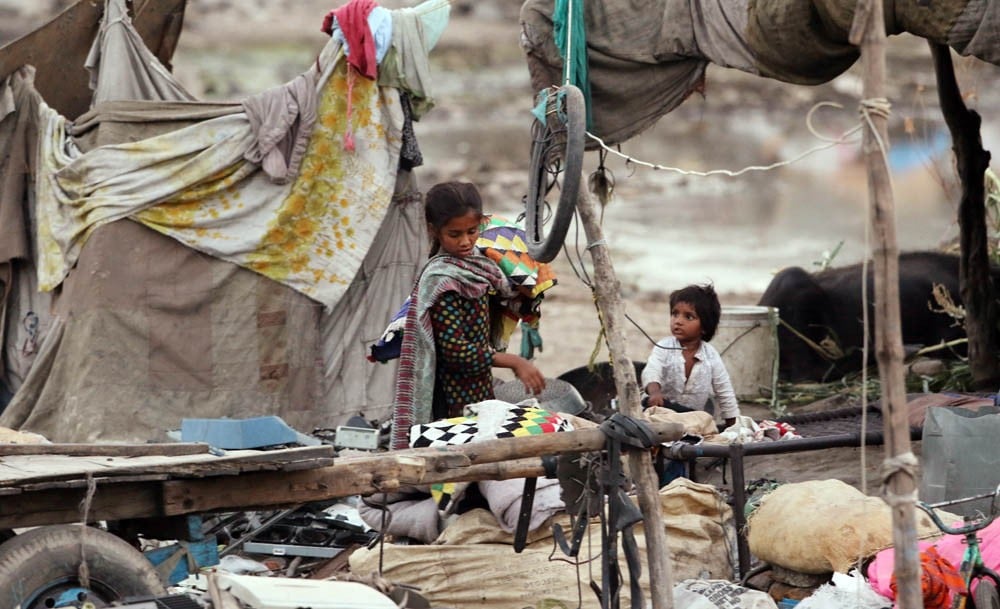
In a run-down katchi abadi, near the industrial district of Kot Lakhpat, the ‘houses’ are made of cardboard box, plastic and straws, and the dwellers have no access to basic provisions

The treacherous Lahore heat bloomed in young Ruby’s cheeks. Her smile is infectious and her idiosyncratic remarks leave you smiling.
Out of habit, she carries a broken, orange cell phone on her all the time. She guardedly confided in me that it doesn’t even work but she feels significant with a phone in her hand. Ruby abides in a run-down slum, near the industrial district of Kot Lakhpat.
It’s a house made out of cardboard box, plastic and straws. With no access to basic provisions, her surroundings are highly unhygienic and the stench of animal waste and trash is nauseating. The air is punctuated with a lingering odour. Understandably, sanitation and clean drinking water are alien terms here.
The poverty that permeates their so-called homes is a dismal sight and certainly not an uncommon one in the city, while we nonchalantly drive off in our air-conditioned cars in scorching, golden afternoons.
Yet, the camaraderie that surrounds is pleasantly shocking. Despite everything these slums have a strong sense of community and people in the vicinity seem oblivious to the mounds of faeces and diseases that plague their impoverished environs.
A few lucky residents have radios and local stations to keep them entertained in the evenings. The women are talkative and graciously invite me to have a seat on a tattered charpoy. The men and one rather flamboyant eunuch are busy chatting on a mat made of hay bale.
Ruby tells me that her husband is a part-time "mazdoor" (labourer) and daily wages are awfully low. It’s only on a few good days in a month, which are few and far between, that they have enough money to have one proper meal a day.
While letting me in on the inside details, she looks around to scan her hovering husband and whispers in hushed tones, "Baji, assi kithoun khana ae? Pukhay marr rae aan." (How are we supposed to feed ourselves? We’re dying of hunger.)
She also says, lamentingly, that if her husband ever manages to save some money, he usually squanders it on drugs.
It’s a common situation. If the men here don’t have enough money for expensive substances like charas or desi moonshine, they just dose themselves with a lot of cough syrup.
The slums have one thing in abundance: children. They are everywhere, usually playing frivolous little games in the clammy heat and cling affectionately to outsiders like a limpet.
Ruby has three children -- two daughters and a son, named Shazia, Nazia and Khan respectively. Khan is the youngest and also the naughtiest in the crowded family. He gathers all his friends from the slum and proudly tells them that I shall be taking his picture.
Khan is quite precocious for his age and looks very interested in the contents of my bag, inquiring if I have any toffees for him.
The women say that some kids are eager to go to school, but circumstances prevent them from pursuing such ambitions. Ruby also shrugs off any talk of school or education, insisting that her son should work from a young age so that he can contribute to the wages and make himself "useful."
Most women in the slums work odd jobs as domestic helpers to make ends meet but they don’t have stable occupations or income. They are typically ‘idle’ and end up tending to their kids all day long.
Sajda is Ruby’s sister-in-law and the oldest among the women even though she’s only 36. She flippantly calls herself the "chairman" of the slum and is a huge fan of smoking cheap cigarettes.
She claims that it is futile for the womenfolk to work because while the men are out and about, doing their jobs (picking garbage or working on sites), it is the women who make sure that their rather humble abodes bear no forced evictions.
Quite often these slums are destroyed and torn down by local authorities because pitiable slums are repulsive to the metropolitan city environment.
Fear of demolition is a constant looming threat in the daily lives of the slum dwellers. The authorities don’t seem to realise that forcible slum clearance and relocation does more harm than good.
Sajda believes that they are ‘holding the fort down’ from the boogeyman while the men go looking for bread. She has the devil’s tongue and can curse out in fluent Punjabi like nobody’s business. Beneath her tenacious exterior is an angry, bitter girl who wails the fact that nobody cares about them and if only the authorities had done something about their living conditions -- maybe allotted them proper housing, land rights or opportunities for employment -- their lives would be much better and meaningful. Meagre developmental policies, lack of rehabilitation programmes and failure to address these issues have resulted in deep mistrust amongst the dwellers.
Sajda is adamant that these circumstances have bred resilience and defiance within her people. She is the prototypical ‘old soul’ -- wise and farsighted. She breaks free from her trance while abusing the apathetic lot, takes a long drag from her stale cigarette and loudly yells at the nearby kids for harassing the chickens.